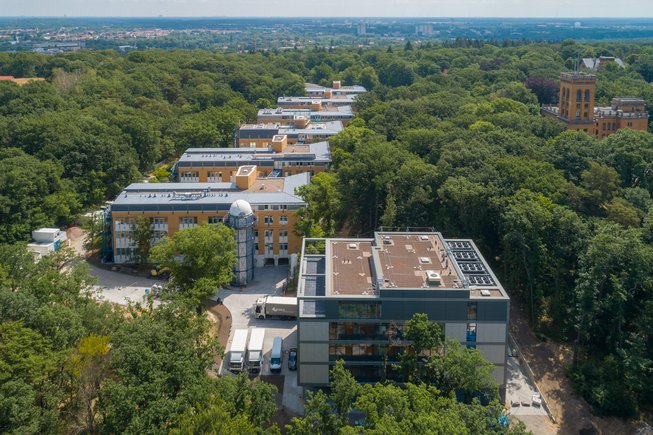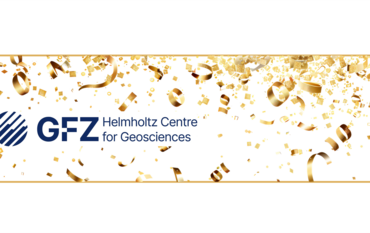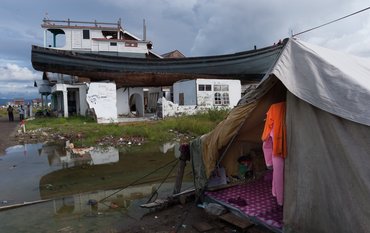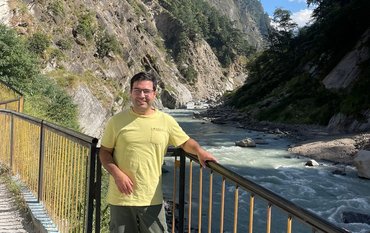The German Research Centre for Geosciences (GFZ) has now been awarded a silver certificate for sustainable construction for its “Helmholtz Laboratory for Integrated Geoscientific-Biological Research” (GeoBioLab), which will open in 2021. State Secretary Dr. Rolf Bösinger from the Federal Ministry of Housing, Urban Development and Construction presented the certificate to the GFZ's Administrative Director, Dr. Stefan Schwartze, at the BAU trade fair in Munich on Tuesday, 18 April.
“We are very pleased about this award. The successful silver certification shows that we not only research for sustainability, but also conduct our research in a sustainable manner,” said Stefan Schwartze.
The GeoBioLab: sustainable new building
The GeoBioLab took about two and a half years to build and cost a total of 16 million euros. It offers laboratories and offices for two sections of the GFZ as well as a server room on almost 1,500 square metres of main floor space. It was designed by the architectural firm Heinle, Wischer und Partner. The most striking feature is the innovative energy concept, which uses the waste heat from the server room to preheat the air for the laboratory ventilation. In addition, the waste heat supplies other adjacent parts of the GFZ building with heat. From the beginning, the highest quality level for low-pollutant building materials was also aimed for. To this end, all products used were comprehensively tested and documented during construction.
After its completion, the GeoBioLab was checked against the criteria of the Rating System for Sustainable Building (BNB) and has now been awarded the silver certificate.
Research for sustainability at the GeoBioLab
The “Helmholtz Laboratory for Integrated Geoscientific-Biological Research”” (GeoBioLab) primarily serves to research the deep biosphere and the interactions of the biosphere with the geosphere and the climate. Life kilometres below the earth, the so-called deep biosphere, has an impact on important processes, for example in the formation and decomposition of the climate-relevant gas methane in permafrost deposits. It also plays an important role in the use of underground space, for example for the storage of gases in the course of the energy transition. Significant interactions also occur at interfaces between microorganisms and minerals, for example in snow and ice algae on Greenland's glaciers. The microorganisms accelerate melting processes there.




![[Translate to English:] Fire in a forest, smoke rising, aerial view from above](/fileadmin/_processed_/8/3/csm_2025_01_06_AdobeStock_415831729_5a0e6d50d3.jpeg)









![[Translate to English:] [Translate to English:] Abror Gafurov von dem Schriftzug "Welcome to Azerbaijan" und den UN und COP Logos](/fileadmin/_processed_/2/5/csm_2024_11_Baku_COP29_Abror_Gafurov_1042faec82.jpeg)


![[Translate to English:] Martin Herold standing in front of the library on the Telegrafenberg](/fileadmin/_processed_/c/d/csm_Martin_Herold_d385ee4dd9.jpeg)
![[Translate to English:] Many people are listening to a presentation in the GFZ lecture hall.](/fileadmin/_processed_/c/a/csm_1_Bild1_hell_b9c0e9f5ed.jpeg)






![[Translate to English:] Both scientists sitting on stools in front of a wall of books in the Telegrafenberg library](/fileadmin/_processed_/6/6/csm_Buiter_Castell_DORA_4_e87cb1ea18.jpeg)
![[Translate to English:] Gruppenbild mit 4 Personen](/fileadmin/_processed_/8/d/csm_20241017_GFZ-Emmerman-Medal-005_web_reinhardtundsommer_21a414fa4a.jpeg)






![[Translate to English:] Ice landscape with five red tents](/fileadmin/_processed_/8/9/csm_Zeltlager_auf_dem_Eis_Urheberin_Jenine_McCutcheon_5ced2d523b.jpeg)